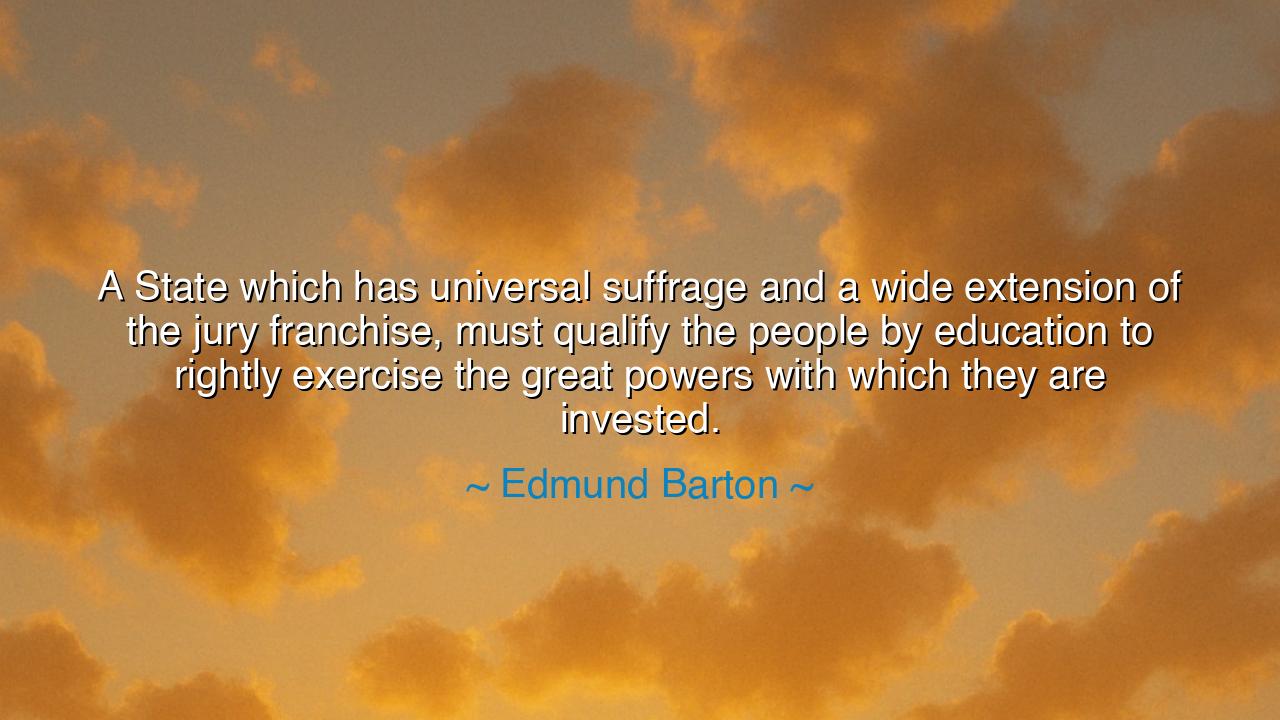
A State which has universal suffrage and a wide extension of the
A State which has universal suffrage and a wide extension of the jury franchise, must qualify the people by education to rightly exercise the great powers with which they are invested.






Edmund Barton, the first Prime Minister of Australia and one of the architects of its federation, once proclaimed with solemn wisdom: “A State which has universal suffrage and a wide extension of the jury franchise, must qualify the people by education to rightly exercise the great powers with which they are invested.” In this saying he laid bare a truth that echoes across the ages: that freedom without knowledge is fragile, and that the sacred powers of suffrage and justice can only endure if the people are armed with education. For the vote is not merely a right, but a responsibility; and the jury box is not only a civic duty, but a solemn judgment seat where ignorance may endanger the lives of men.
The origin of these words lies in the birth of the Australian nation at the dawn of the twentieth century. Barton, guiding the new Commonwealth, saw that democracy was not self-sustaining. It required a citizenry capable of discernment, able to weigh arguments, to see through deception, to choose leaders wisely, and to uphold justice fairly. He knew that a State which grants universal suffrage—the right of all to vote—cannot stop there. It must also prepare the people to use that power, lest liberty be wasted or corrupted. Thus, he bound education to democracy, declaring them inseparable companions.
History confirms his wisdom. In ancient Athens, the birthplace of democracy, citizens were expected not only to cast votes but to be informed participants in civic life. Education in rhetoric, philosophy, and law prepared them to debate, to serve on juries, and to govern themselves. When Athens neglected this, its democracy faltered. So too in Rome, where a people once vigorous in civic virtue became careless, allowing demagogues to corrupt the Republic. The lesson of history is plain: democracy without education invites decay.
Consider also the story of the United States after the Civil War. With the abolition of slavery, millions of freedmen were granted the right to vote. But without access to education, their power was vulnerable, easily suppressed by violence, intimidation, and deceit. Only when schools were established, when literacy spread, and when civic understanding grew, could their rights begin to bear fruit. The example reveals the danger Barton warned of: great powers given without education may wither under the weight of ignorance and oppression.
The meaning of Barton’s words is therefore both heroic and sobering. He tells us that rights are not enough; they must be matched by responsibility, and responsibility must be guided by knowledge. The people are sovereign in a democracy, but sovereignty without wisdom is tyranny of another kind—the tyranny of blind majority. Education is the shield against demagoguery, the compass against corruption, the fire that keeps liberty alive.
The lesson for us, children of tomorrow, is clear. Do not treat the right to vote as a trivial act, nor the jury box as a mere duty. See them as sacred trusts, for in them rests the fate of nations and the lives of men. But know also that these powers demand preparation. If you would honor them, you must seek knowledge—of history, of law, of truth—so that your choices are not swayed by ignorance or deceit. Democracy is not sustained by ballots alone, but by the informed mind and the upright conscience.
Practical actions flow from this. Read not only the slogans of parties but the substance of policies. Study the history of your nation, so that mistakes of the past are not repeated. Engage in discussion, not with anger but with reason, sharpening your judgment as iron sharpens iron. Support education in your community, for in teaching the young, you safeguard the liberty of the future. And when you vote or serve, do so with the gravity of one who holds the destiny of the people in hand.
So let Edmund Barton’s words resound through time: “A State with universal suffrage must qualify the people by education.” Guard this truth well. For in the union of liberty and knowledge lies the strength of democracy, and in their division lies its downfall. Walk, then, as both free and wise, lest the powers given to you be squandered, and let education be the constant companion of freedom.






AAdministratorAdministrator
Welcome, honored guests. Please leave a comment, we will respond soon